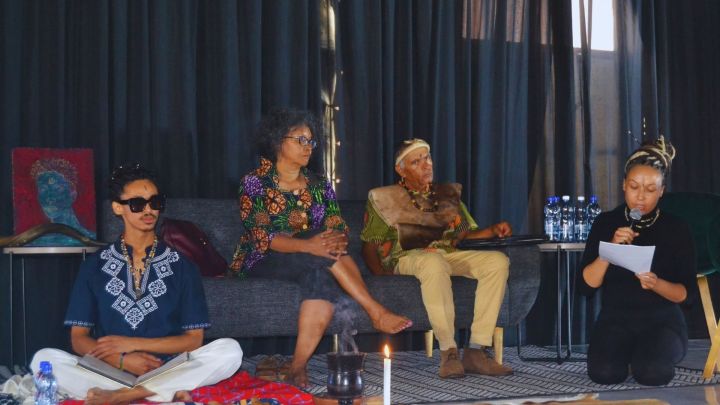HISTORICAL FIGHT FOR RIGHTS
’Thirty years later, we are still marginalised’ — indigenous communities’ fight for recognition continues

Hundreds of people gathered at Constitution Hill to commemorate Human Rights Day on Thursday, 21 March. While the nation has enjoyed 30 years of democracy, the fight for recognition and the right to self-determination continues for indigenous communities.
Constitution Hill was alive with activity as hundreds of people descended on the venue to celebrate Human Rights Day, which commemorates the 1960 Sharpeville massacre when the apartheid police gunned down scores of unarmed civilians who were protesting against oppression.
The 6th edition of the Constitution Hill Human Rights Festival treated NGOs, civil society organisations and members of the public to art exhibitions, live music, film screenings and, most importantly, critical dialogues to dissect different human rights issues facing the nation as South Africa celebrates 30 years of democracy.
“When we talk about human rights, it means we are talking about human beings. I’m not talking about Black, White, Coloured, or Indian. I’m talking about us as human beings, not a racial classification. So, we’re celebrating us as humans today.”
These were the words of Keith Duarte, also known as Chief !Xam, as he and his other panel members discussed the current state of indigenous people in South Africa.
Joining Chief !Xam on the panel was ANC Head of Policy and Research and NEC member Fébé Potgieter-Gqubule, Indigene Corefio – the director of NPO Kx’am – and !Xam Sam Fortuin, an interdisciplinary artist.
According to Corefio, the indigenous people of South Africa are the /Xam people, who have some of the oldest DNA on the planet — which is why many people refer to them as the First Nation.
Corefio explained that historically, the /Xam did not believe in hierarchical structures, adding, “This is important to note, especially as we discuss constitutional values, democracy, and equality for everybody. We invented a lot of things, and I feel like we invented democracy”.
Plight of indigenous people
The hardships faced by the indigenous people of South Africa can be traced back to the 17th century when Dutch and British colonial settlers landed in the Cape.
“There was like a continuous back and forth between colonial powers and the indigenous people that they found when they got here. This eventually resulted in the systematisation or institutionalisation of hunting indigenous people,” Corefio said. “The /Xam have faced centuries of genocide, ethnocide, dispossession and marginalisation, and have been perpetuated, and these have been perpetuated by the current state.”
Racial classification, right to land issues
One of the critical issues that the panel highlighted was that the racial classification of coloured, which has its roots in colonialism, stripped them of their identity as “First Nation people.”
Potgieter-Gqubule said apartheid used the classification of coloured further to entrench the decimation of identity, history and language as well. Corefio said that the continued use of the classification strips indigenous people of their right to self-determination.
This classification, Duarte said, adds to indigenous people’s struggle for the right to ownership of ancestral land. One of the key issues that indigenous communities are facing is the right to receive land. The government’s bid for land restitution and redistribution has come under fire because it allegedly prioritises black people but leaves indigenous people in the fray.
“The only thing they have given us is the Traditional and Khoisan Leadership Act, which recognises the Khoisan traditional leadership structures. Number 1, we were not consulted in that act, and that’s why the Constitutional Court ruled it unconstitutional. Secondly, the leaders who were recognised through that act were offered monetary compensation. Nothing is said about land,” Duarte said.
Duarte added that he rejected the act and would not support it because it only benefitted a few politically connected people and left the rest of the indigenous population to live in abject poverty.
“We are not free. I, for one, am not celebrating Human Rights Day because my constitutional rights have been violated and are still being violated,” Duarte said.
Corefio called for the Land Act to be amended to allow First Nation people in the land restitution process.
Demand for government
The panel made demands for the government to ensure that indigenous people enjoy the full constitutional rights they are entitled to.
They called on the government to recognise all indigenous languages as official languages to be taught in schools in order to preserve the culture of First Nation people. Corefio also called on the government to formally recognise the Khoi and the /Xam as the First Nation.
“The government needs to take steps to facilitate dialogue with Khoi people and /Xam people on healing from the lasting effects of colonisation and genocide of our people, identity, languages and culture. It’s a journey. It took centuries to get us erased, and they couldn’t get that right, and it’s going to take centuries to heal,” Corefio said. DM




















 Become an Insider
Become an Insider
Valid point by Keith Duarte of the /Xam, first people!
They want their own land NOW in the current South Africa, founded (baptized) in 1909 by the Brittish parliament.
Centuries before 1909 the /Xam have been nomads, migrating across Afrika, from Cameroon to the Cape. Their migration qualifies them to claim land (homeland) in at least 20 African states, because they migrated through the entire African continent.
Why don’t the /Xam claim land in Sudan, Congo, Tanzania, Zambia, Zimbabwe, Botswana or Namibia. A landclaim for the /Xam would be equally valid in all of the African countries.
It should be much easier for the /Xam to claim land in the mentioned Black countries, of which some are very sparsely populated, than in the current overpopulated SA.
Why do the /Xam claim land only in SA and not in all the other African states?
What do the /Xam propose must happen to the other 11 ethnic groups that call SA home?
If the /Xam get their own homeland, do they propose homelands for the other 11 ethnic nations too?
A homeland for the Xhosa, Tswana, Venda, Tsonga / Shangaan, Ndebele, Zulu, Pedi, Tswana and Afrikaners?
That brings us to the ‘elephant in the room’ of South Africa where politicians attempt to ignore the reality of ethnic differences.
That brings us to the 1960 plan of the National Party called ‘Seperate Development’.
Perhaps ‘Seperate (but equal) Development’ policies must be dusted and reconsidered for the future dispensation of SA to replace the FAILED ‘Rainbow Nation’, ideology.
If the /Xam (first Nation) propose the dispensation of Seperate Development to SA, it might work … coming from Black people in stead of Whites?
Is Keith Duarte serious about own land for the /Xam (and the other 11 nations)?
Or is he just trying his luck for some FREE CASH from the pockets of SA taxpayers?
Yeah you see the problem is these people dont know their own history. History is written down and it definitely didn’t go like that. The day you admit you had and would have had problems without even one white in africa, is the day you can build a future. Blaming others for your lack off doest get you anywhere
When White’s brought civilization is when the shit started
“When we talk about human rights, it means we are talking about human beings. I’m not talking about Black, White, Coloured, or Indian. I’m talking about us as human beings, not a racial classification. So, we’re celebrating us as humans today.” A laudable statement reminiscent of MLK’s dream for a future where individuals “will not be judged by the color of their skin but by the content of their character.” But we continue to give a middle finger to this principle when it comes to who should give and who should be given.
He was speaking from the point of an educated man who knew all to well that in the land of the blind the one eyed man is king
So much for the famous “democratic constitution ” these peoples wete hereFirst ,the banyi speaking nguni came down the east african coast from places like Tanzania, Kenya etc etc they are warlike amd when they entered Southern africa the zulu,swazi and xhosa all pusher out the indigenous khoi and san the people called BUSHMAN because of their cave paintings,whilst the west and central african population moved southwards ending in the bitter conflict with the zulus in present day limpopo and even into Zimbabwe. This was happening when he dutch setlers were moving NORTH from the cape,History NEVER lies. Sooo now these nguni settlers call the country of South Africa THEIRS . The dutch also have a right but PRIMARILY it belongs to the original inhabitants